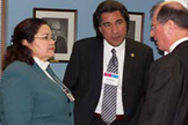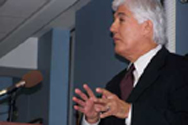

The Intercultural Development Research Association, supported by Houston Endowment, Inc., led this initiative, titled InterAction: Higher Education and Latinos in the New Millennium. It sought to build stronger, enduring links among K-12, institutions of higher education and the community and business sectors to effect meaningful education reform.


“In Texas the pre-kindergarten through 20 pipeline is not only clogged at various transition points, it is, in fact, nonexistent,” stated Dr. María “Cuca” Robledo Montecel, executive director of IDRA. “There is no pipeline for Texans. There is no pipeline that moves students from quality early childhood education to college graduation and beyond.”
The 31 policy solutions unveiled in February follow IDRA’s framework that identifies seven distinct areas of opportunities for reform:
- preparation,
- access,
- institutional persistence,
- affordability,
- institutional resources,
- graduation, and
- graduate and professional studies.
See the event proceedings publication.
Dr. Robledo Montecel added: “This is an opportunity to look at the challenge of Latino college access and success from a broad platform. One that creates not only common ground but common cause. One that examines not only state level policies, but also institutional and system policies. One that assumes that the future is neither in someone else’s hands nor in our individual hands but in our connected hands.”
At the statewide event in 2005, participants reviewed policy solutions stemming from a series of three InterAction forums. Convened in the fall of 2004, each forum addressed issues facing a specific community of interest – urban, rural or border areas. The forums were hosted by President Max Castillo and the University of Houston-Downtown, President David Watts and the University of Texas-Permian Basin, and President Blandina “Bambi” Cárdenas and the University of Texas-Pan American, respectively. The LULAC State Education Committee and the Texas Latino Education Coalition co-hosted all three forums.
Dr. Cárdenas stated: “We have the opportunity to take what we’ve learned, to understand not only our responsibility but our power. One of the things that has changed dramatically from 30 years ago is the scale upon which we have to act. In this country, Latinos are 31 million people. Projects no longer work. Individual successes no longer work. We need to be thinking in terms of mass strategies that emerge from fundamental policy changes.”
Dr. Castillo added: “We are in a mission to really improve education and to do what we can to really advance the educational experience and to create, I think, a greater involvement in the community and produce students who really will make a difference in our society and Texas and the world.”
Dr. Watts stated: “My favorite number from the Fabulous Thunderbirds is a song entitled ‘How do you spell love?’ That’s the title of the song. And how do you spell love? M-O-N-E-Y is how you spell love. And money will do an awful lot to help us overcome the handicaps associated with higher education in Texas.”

